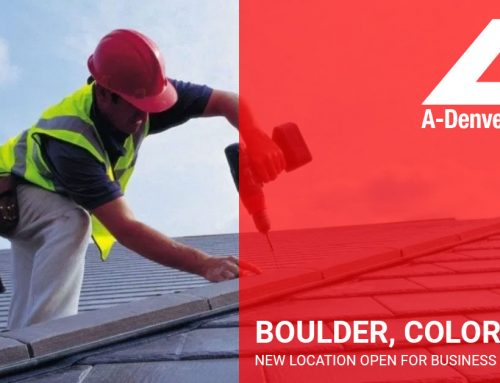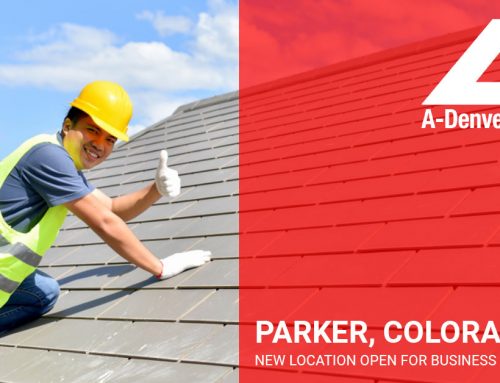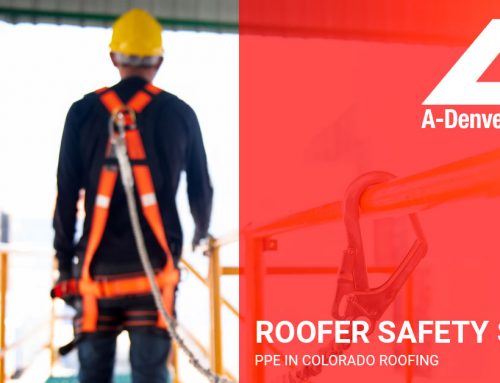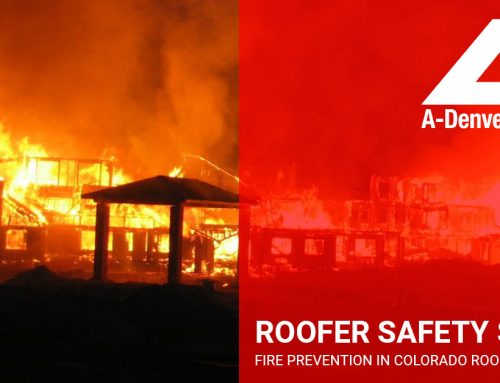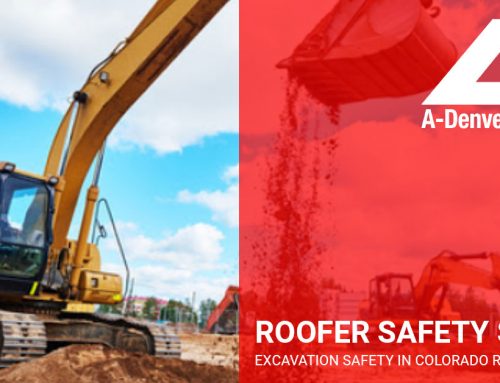Why you should choose Single-Ply PVC over Built-Up Roofing Systems for your next reroofing project in Colorado.
At A-Denver Roofing, our reputation stems from proven performance reroofing projects in Denver and Colorado Springs. We install thermoplastic roofing and waterproofing systems widely recognized for exemplifying the highest standards of quality, reliability and watertight protection. The PVC membranes we install are created in a controlled environment and are on display on military bases all throughout Colorado, in every imaginable climate. We install using the same basic membrane formulation that was created in 1964 is still in use today. All told, A-Denver Roofing has installed close to 40 thousand square feet of thermoplastic roofing and waterproofing systems in Colorado to date.
In the last 40 years, with the introduction of the single-ply PVC roof system, the increase in the price of crude oil, and the emphasis on energy efficiency, built-up roofs have been in a steady state of decline. Built-up systems are labor intensive, generate fumes that are disruptive to building occupants and applicators and require maintenance throughout the life of the roof by the owner. These are some of the main reasons why A-Denver Roofing recommends installing single-ply PVC roofing systems to replace your old BUR system in Denver and Colorado Springs. The quality of roofing asphalt has declined in the last few decades as a result of cleaner coal burning plants which produce fly-ash which is a key component of BUR asphalt. This has resulted in a general increase of melting temperature for roofing asphalt. This in turns leaves BUR more susceptible to damage from freeze thaw cycles. BUR roofs vary widely in quality based on the number of ply layers the quality of the bitumen and the quality of the labor installing the roof. The greater the number of plies (4-5 minimum), the higher the likelihood of a quality roof, but also a higher cost.
Manufacturing and Installation
A-Denver Roofing’s chosen roofing membranes were formulated over 40 years ago. The same basic formulation that has protected buildings for all these years is still in use today. Their manufacturing process creates a monolithic membrane that exhibits tremendous cohesive strength, inhibits water wicking along the seams and eliminates the need for caulking of exposed edges. These PVC membranes are produced in a controlled environment ensuring the correct thickness. Seam integrity is an essential ingredient of a roof that doesn’t leak. A-Denver Roofing’s installed PVC seams are hot-air welded creating a monolithic watertight seal. In contrast, BUR requires an open flame or hot kettles that create a fire hazard. This fire hazard has caused buildings to burn down in Denver. Built-up roof systems are fabricated in the field and not in a controlled environment. Multiple layers with different tensile strengths are sensitive to temperature and moisture and when incorrectly installed, lead to the membrane blistering, cracking, crazing, and eventually failing. This can cause havoc for building owners in Denver and Colorado Springs due to Colorado’s severe wind and rain events. Special coatings, granular surfaces or rock and gravel are required for UV and fire protection. These systems typically weigh 8-15 times more than a PVC roof system and pose a risk of airborne projectiles in the event of high winds, such as occur in Colorado. For this reason; stone ballast has been outlawed in most municipalities in Denver and surrounding areas; including the 2015 IBC, (International Building Code).
UV Resistance
A-DEnver Roofing’s PVC membranes are made with only the best polymers in the business ensuring long-term weatherability and protection from Colorado’s harsh UV rays. Our “real world” experience has been proven time and time again in all types of Colorado cities and climates around the state for over 40 years. When subjected to accelerated weathering tests, our time-tested formulation exceeds the requirements of all known standards in Colorado. In contrast, Asphalt exposed to Colorado’s high UV radiation deteriorates quickly causing the surface of built-up roofs to age prematurely and eventually become hard and brittle. As a result, BUR roofs in Denver and Colorado Springs require coatings or granular surfaces, which require maintenance, or rock and gravel to protect the membrane. Even with these coatings and granular surfaces, built-up roofs have a low reflectance rating. This low reflectance rating provides little to no energy savings whereas PVC roofs reflect the heat from the sun, thereby reducing building’s cooling costs.
Chemical Resistance
Our PVC roofing systems resist a wide variety of chemicals and contaminates typically found on Colorado roofs. Chemicals and contaminates typically found on a roof and in the environment can breakdown asphalt. This reduces the life expectancy of a built-up roof system. Chemical exposures are excluded by the majority of built-up roofing system manufacturers. Yet another reason to choose A-Denver Roofing to install a PVC roofing system for your next re-roofing project in Denver and Colorado Springs.
Ponding Water
Although all roof systems in Colorado should be designed to drain or shed water, most roofs have areas of ponding water. A-Denver Roofing’s PVC membranes have been used for roofing, waterproofing, civil engineering, and water containment by governments across Colorado. Ponding water does not affect the performance of our PVC membranes or its seams. We are one of the only commercial roofing contractors who don’t exclude ponding water from our warranty. Whenever you have water sitting on a Colorado roof you increase your risk of water penetration. Built-up systems are susceptible to ponding water which loosens the granular surface and the UV coating, especially in freeze/thaw climates like Colorado. The Freeze-thaw climates of Denver and Colorado Springs accelerate the breakdown of the bitumen compromising the exposed edges. Ponding water also leads to plants and trees taking root in the cracks of BUR systems. If not treated, roots can penetrate through the system allowing water infiltration. The majority of built-up roofing manufacturers exclude ponding water from their warranties. Choose A-Denver Roofing for your next commercial roofing project in Denver and Colorado Springs.
Wind Resistance
A-Denver Roofing offers numerous “high wind systems,” we can even design and warranty your roof to resist winds of 120 MPH and above, perfect for the high wind events in Colorado. In contrast, The stone surfacing on top of the built-up roofing that becomes un-bonded can be a hazard in Colorado’s high wind events.
Ease and Quality of Repair
Unlike other roof membranes, PVC membranes are repairable throughout their serviceable life. New PVC membrane can be hot-air welded to aged material creating a “like new” watertight seam. Unlike PVC where you can cut new membrane to size and hot-air weld a watertight patch, Built-up systems use cold applied asphalt and patching material. The application of the new material over the old is not an effective long term solution in Colorado. Built-up systems also rely on pitch pockets as their solution to detailing penetrations. Pitch pockets are known as a constant maintenance issue because of the cracking and splitting with roof top movement that occurs in Colorado’s freeze thaw cycles.
Fire Resistance
A-Denver Roofing’s PVC membranes are inherently fire resistant. PVC membranes self-extinguish and resist the spread of flames. A-Denver Roofing PVC single-ply membrane provides the best protection from the spread of flames in a fire situation and exceed the requirements of both UL and FM. In contrast, Asphalt is inherently flammable. To achieve a Class A fire rating, asphalt needs surface finishes like acrylic and granules. These surfaces must be maintained throughout the life of the system to maintain a fire rating in Colorado. These maintenance costs should be factored into the Life Cycle Cost of the system, thereby pricing BUR systems out of competition with PVC single-ply membrane roofing systems.
Reflectivity
A-Denver Roofing’s EnergySmart Roof and its high level of solar reflectance has been selected by military entities in Colorado consistently over the years because it’s proven to reduce energy consumption, assist in abating urban heat islands, and help slow the formation of smog. In contrast, Built-ups require coatings, granular surfaces or rock and gravel to increase their reflectance ratings. Even with these coatings and granular surfaces, built-up roofs have a low reflectance rating resulting in increased cooling costs. The rough surface of gravel ballasted roofs will result in diminished solar reflectance. These surfaces must be maintained throughout the life of the system to maintain this reflectance rating. These maintenance costs should also be factored into the Life Cycle Cost of the system. Yet another reason why choosing a single-ply PVC roof for your next reroofing project in Denver and Colorado Springs is a smart and financially prudent choice.
Flashings and Details
A-Denver Roofing expertly installs flashing membrane, pre-fabricated boots and expansion joints that can be stretched and molded to flash almost any penetration found on a roof. These flashings expand and contract with the membrane eliminating the possibility of coming loose. Heat welding the seams and overlaps ensures the building stays watertight. In contrast, Built-up roofs are most susceptible to differential movement between the wall and roof deck could which causes flashings to come loose and leak. Typical roof top penetrations cause problems because of the difficulty in flashing BUR. BUR roofs are highly dependent on pitch pockets to seal certain types of roof penetrations. These are high maintenance items that lead to leaks.
In conclusion, choosing A-Denver Roofing to install a PVC single-ply membrane roofing system for your commercial building in Colorado is the best choice to protect your investment for decades to come. Call us today to schedule a free consultation and to receive a no obligation estimate for your next roofing project in Denver and Colorado Springs.


